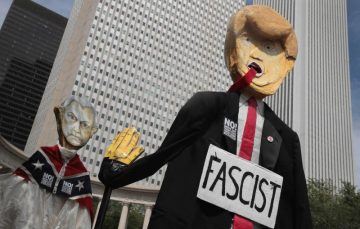Frank Ferudi in Sp!ked:

Historically, US presidential elections were dominated by competing views on economic and social issues. No longer. This approaching election has increasingly been consumed by a cultural conflict, at the heart of which is a war over American history. But this is no mere disagreement over the precise details of what happened three or four centuries ago. It is a battle for the very soul of the United States. The principal battle is being fought over the founding of the US. As we will see, this is best captured, by, on one side, the New York Times’ 1619 Project, which contends America was founded when African slaves first arrived in Jamestown; and, on the other, President Donald Trump’s mooted 1776 Commission, which reasserts the traditional, would-be inspiring narrative of revolution and independence as America’s founding moment.
All of this raises questions of the utmost importance. Why has America’s founding become such a vital issue in the 21st century? And, more broadly, how should humanity engage with the legacy of its past achievements?
History has rarely appeared more alive than it does in the West today. Even before the Black Lives Matters protests this summer, protesters had been treating symbols of the past, be they building names or statues, as if they were living things. Some protesters even claim that these inanimate objects pose a threat to their wellbeing, with some Rhodes Must Fall campaigners at the University of Oxford claiming that merely walking past Cecil Rhodes’ statue is traumatic. Many more treat these symbols of the past as if they are living adversaries, against whom every act of vandalism or toppling is a vital act. You could see something of this when activists pulled down the statue of Edward Colston in Bristol earlier this year. They did not simply want to topple it. They wanted to defile it, humiliate it, debase it. And so they pulled it down, and then dragged it along the street before throwing it into the river. It was almost as if they were parading the corpse of a hated tyrant before his liberated people, rather than a statue of a long-forgotten slave-trading merchant who died 300 years ago.
More here.
